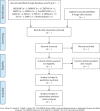Herbal medicine Sihogayonggolmoryeo-tang or Chai-Hu-Jia-Long-Gu-Mu-Li-Tang for the treatment of post-stroke depression: A protocol for a systematic review and meta-analysis
- PMID: 30235703
- PMCID: PMC6160176
- DOI: 10.1097/MD.0000000000012384
Herbal medicine Sihogayonggolmoryeo-tang or Chai-Hu-Jia-Long-Gu-Mu-Li-Tang for the treatment of post-stroke depression: A protocol for a systematic review and meta-analysis
Abstract
Introduction: This systematic review protocol describes the methods that will be used to evaluate the efficacy and safety of herbal medicine Sihogayonggolmoryeo-tang (SGYMT) or Chai-Hu-Jia-Long-Gu-Mu-Li-Tang for the treatment of post-stroke depression.
Methods and analysis: The following electronic databases will be searched up to July 2018 without language or publication status restrictions: MEDLINE, the Cochrane Central Register of Controlled Trials (CENTRAL), EMBASE, Allied and Complementary Medicine Database (AMED), Cumulative Index to Nursing, and Allied Health Literature (CINAHL), and PsycARTICLES. We will also search Korean and Chinese databases. Any clinical randomized controlled trials related to SGYMT treatment for post-stroke depression will be included. Changes in the degree of depression and adverse events will be assessed as primary outcomes. The total effective rate and changes in neurological function, activities of daily living, and quality of life will be evaluated as secondary outcomes. Study selection, data extraction, assessment of study quality, and evaluation of the quality of evidence for the main findings will be performed independently by 2 researchers. The data synthesis and analysis will be performed using RevMan version 5.3. The results will be expressed as a risk ratio for dichotomous data and as the mean difference or standardized mean difference for continuous data. Data will be synthesized by either a fixed-effects or random-effects model according to a heterogeneity test or the number of studies included in the meta-analysis. The methodological quality of the included studies will be evaluated using the Cochrane Collaboration's risk of bias tool. The quality of evidence for each main outcome will be evaluated using the Grading of Recommendations Assessment, Development, and Evaluation (GRADE) approach.
Ethics and dissemination: Ethical approval is not required because individual patient data are not included. The findings of this systematic review will be disseminated through a peer-reviewed publication or conference presentations.
Prospero registration number: CRD42018102939.
Conflict of interest statement
The authors report no conflicts of interest.
Figures

Similar articles
-
Efficacy and safety of Sihogayonggolmoryeo-tang (Saikokaryukotsuboreito, Chai-Hu-Jia-Long-Gu-Mu-Li-Tang) for post-stroke depression: A systematic review and meta-analysis.Sci Rep. 2019 Oct 10;9(1):14536. doi: 10.1038/s41598-019-51055-6. Sci Rep. 2019. PMID: 31601868 Free PMC article.
-
Herbal medicine for acute management and rehabilitation of traumatic brain injury: A protocol for a systematic review.Medicine (Baltimore). 2019 Jan;98(3):e14145. doi: 10.1097/MD.0000000000014145. Medicine (Baltimore). 2019. PMID: 30653148 Free PMC article.
-
Herbal medicine on cancer-related fatigue of lung cancer survivors: Protocol for a systematic review.Medicine (Baltimore). 2020 Jan;99(5):e18968. doi: 10.1097/MD.0000000000018968. Medicine (Baltimore). 2020. PMID: 32000424 Free PMC article.
-
Xiao Chai Hu Tang, a herbal medicine, for chronic hepatitis B.Cochrane Database Syst Rev. 2019 Nov 7;2019(11):CD013090. doi: 10.1002/14651858.CD013090.pub2. Cochrane Database Syst Rev. 2019. PMID: 31697415 Free PMC article.
-
Herbal medicine for cervicogenic dizziness: A protocol for a systematic review and meta-analysis.Medicine (Baltimore). 2020 Dec 18;99(51):e23852. doi: 10.1097/MD.0000000000023852. Medicine (Baltimore). 2020. PMID: 33371169 Free PMC article.
Cited by
-
Spirit-Quieting Traditional Chinese Medicine may Improve Survival in Prostate Cancer Patients with Depression.J Clin Med. 2019 Feb 8;8(2):218. doi: 10.3390/jcm8020218. J Clin Med. 2019. PMID: 30744039 Free PMC article.
-
Understanding Why Post-Stroke Depression May Be the Norm Rather Than the Exception: The Anatomical and Neuroinflammatory Correlates of Post-Stroke Depression.J Clin Med. 2021 Apr 14;10(8):1674. doi: 10.3390/jcm10081674. J Clin Med. 2021. PMID: 33919670 Free PMC article. Review.
-
Yi-Nao-Jie-Yu Prescription Relieves Post-Stroke Depression by Mitigating Ferroptosis in Hippocampal Neurons Via Activating the Nrf2/GPX4/SLC7A11 Pathway.J Neuroimmune Pharmacol. 2025 Apr 11;20(1):35. doi: 10.1007/s11481-024-10167-1. J Neuroimmune Pharmacol. 2025. PMID: 40214929 Free PMC article.
-
Efficacy and safety of Sihogayonggolmoryeo-tang (Saikokaryukotsuboreito, Chai-Hu-Jia-Long-Gu-Mu-Li-Tang) for post-stroke depression: A systematic review and meta-analysis.Sci Rep. 2019 Oct 10;9(1):14536. doi: 10.1038/s41598-019-51055-6. Sci Rep. 2019. PMID: 31601868 Free PMC article.
-
Chinese herbal medicines for the treatment of depression: a systematic review and network meta-analysis.Front Pharmacol. 2024 Apr 3;15:1295564. doi: 10.3389/fphar.2024.1295564. eCollection 2024. Front Pharmacol. 2024. PMID: 38633609 Free PMC article.
References
-
- Benjamin EJ, Virani SS, Callaway CW, et al. Heart disease and stroke statistics-2018 update: a report from the American heart association. Circulation 2018;137:e67–492. - PubMed
-
- Robinson RG, Jorge RE. Post-stroke depression: a review. Am J Psychiatry 2016;173:221–31. - PubMed
-
- American Psychiatric Association. Diagnostic and statistical manual of mental disorders. 5th edWashington, DC: American Psychiatric Association; 2013.
-
- Espárrago Llorca G, Castilla-Guerra L, Fernández Moreno MC, et al. Post-stroke depression: an update. Neurologia 2015;30:23–31. - PubMed
-
- Schöttke H, Giabbiconi CM. Post-stroke depression and post-stroke anxiety: prevalence and predictors. Int Psychogeriatr 2015;27:1805–12. - PubMed
MeSH terms
Substances
LinkOut - more resources
Full Text Sources
Other Literature Sources
Medical
Research Materials

